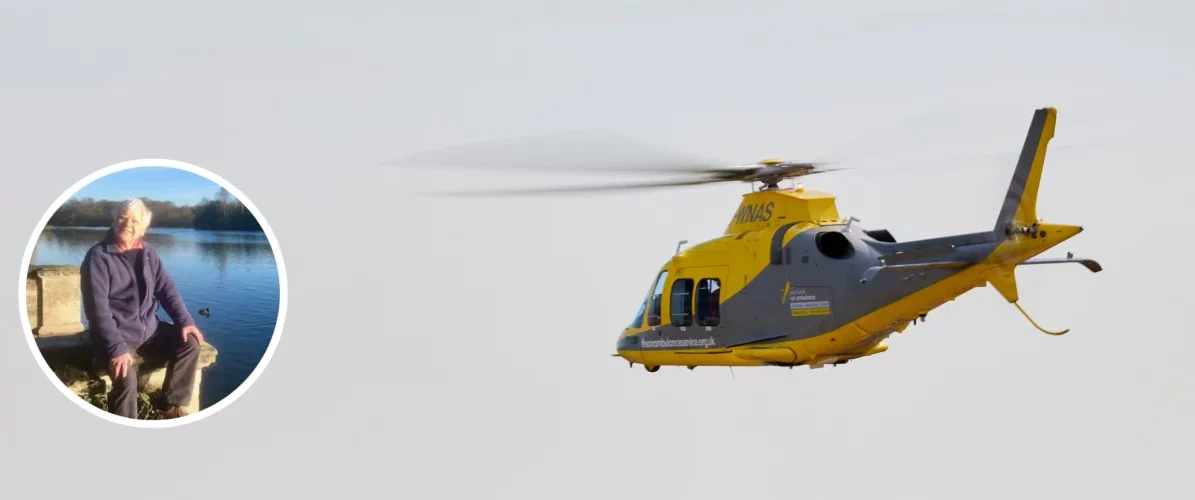Why we fly
John C’s Story

“I don’t think that the air ambulance should have to rely on charitable donations. It provides a vital service that as a society we have come to rely on. Many people don’t know this. The lifesaving work they do is fantastic.”
A walker in his seventies, who suffered a cardiac arrest in a remote coastal location in Lincolnshire, has praised the Warwickshire & Northamptonshire Air Ambulance (WNAA) for the part it played in his survival.
John was flown to hospital in Lincoln in just 18 minutes, compared to a road journey of about an hour, after he collapsed whilst out walking with his wife on salt marshes at Seacroft, south of Skegness.
He was so grateful for what the charity did for him, that John has donated towards funding the cost of another lifesaving mission for another patient.
“I don’t think that the air ambulance should have to rely on charitable donations. It provides a vital service that as a society we have come to rely on. Many people don’t know this. The lifesaving work they do is fantastic,” he says.
When WNAA received the call to attend John, the helicopter was refuelling at Gamston Airfield near Retford, about 64 miles away. It was on its way back to base in Coventry after transporting a patient to Hull Royal Infirmary.
It was the nearest air ambulance available at the time and it took just 24 minutes to fly to where John was on the Lincolnshire coast.
He and his wife had enjoyed a walk on the beach and picnic and were on their way back to their car when John started to feel faint and then collapsed. He did not have a history of heart problems and had no chest pain prior to his sudden collapse.
John says:
“I was amazingly lucky as a local fireman just happened to be jogging by. He knew exactly what to do. It was a very isolated area and we had only seen two other people on our walk that day. The fireman rang 999 and he gave me CPR until the paramedics from the East Midlands Ambulance Service arrived on foot, carrying all their equipment.”
“They couldn’t drive close to where I was as we were about a mile from the road, so they had to run down the marsh. Due to this lack of accessibility, the air ambulance was requested.”
As it was ‘a coastal incident’ two teams from the local coastguard also attended to assist.
When the WNAA crew arrived at the scene John’s condition had been stabilised by colleagues from East Midlands Ambulance Service.
He was put onto a stretcher and carried across the salt marshes to where the helicopter had landed.
“I remember three figures in bright orange suits and helmets manoeuvring me onto the stretcher and someone telling me it would be noisy when the helicopter took off and landed.”
“The doctor monitored my condition during the flight, and I remember someone holding my hand and being very reassuring,” says John.
On arrival at Lincoln County Hospital, John, who lives near Grimsby, but grew up in Skegness, was assessed and admitted for tests and observations.
He spent two weeks there before being transferred by land ambulance to Glenfield Hospital, Leicester where he underwent a quadruple heart bypass operation.
John describes his health now as “almost back to normal” and he still enjoys walking on the Lincolnshire coast. He says that he owes an immense debt of thanks to everyone involved in saving his life when he had the cardiac arrest in September 2021 – especially the off-duty fireman.
He adds:
‘’One piece of technology on my mobile phone also helped facilitate my rescue. It is an App. called ‘What3words’ and it gives your exact position on earth via three words. These are given to the emergency services’ call centre, who then know where you are.
This App. helped to get the paramedics and the air ambulance to me quickly. Please download it as it may be a lifesaver for you or someone else.”
